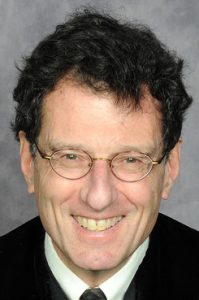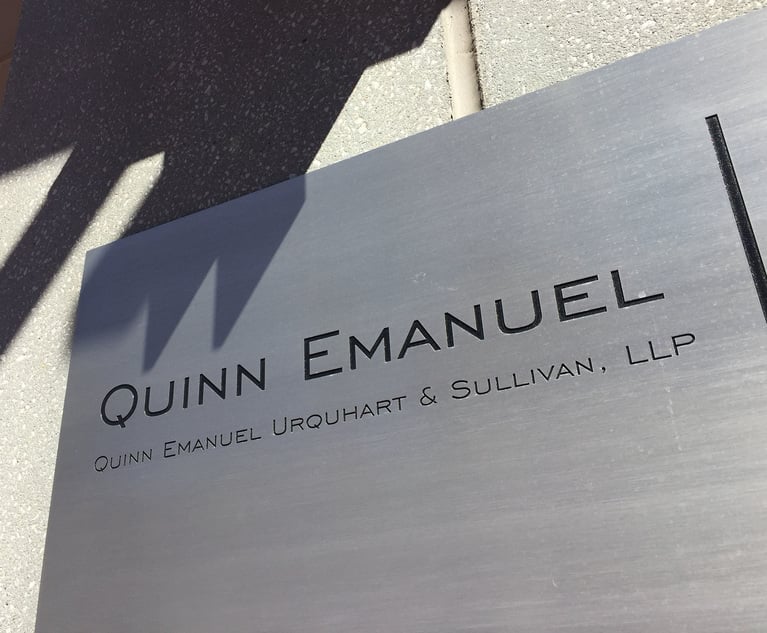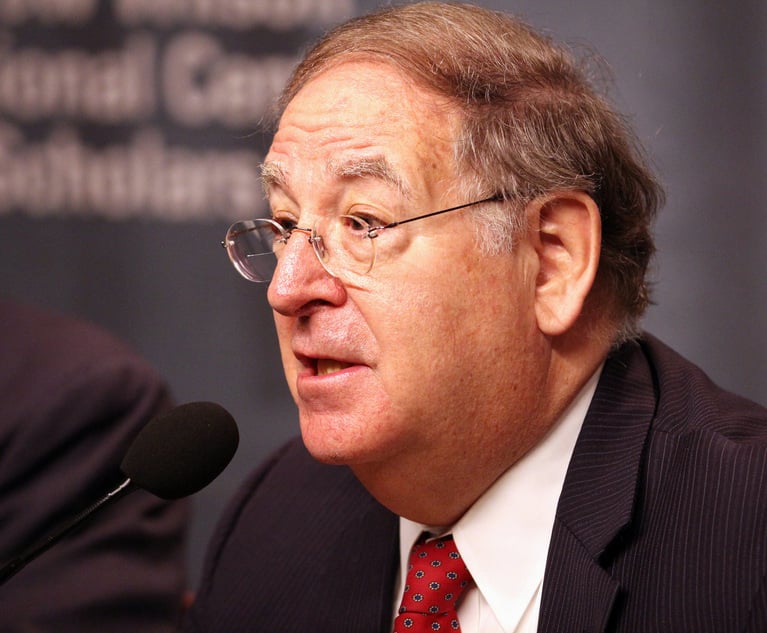Litigation No Substitute for Settlement, Says Opioid MDL Judge
In a marked shift from the first hearing in the opioid litigation, a federal judge praised lawyers for getting closer to reaching a global settlement…
May 10, 2018 at 02:18 PM
5 minute read

In a marked shift from the first hearing in the opioid litigation, a federal judge praised lawyers for getting closer to reaching a global settlement to address the epidemic.
“Judge Ruiz and I want to thank everyone for all the hard work that all of you have been doing over the past several months,” said U.S. District Judge Dan Polster, referring to U.S. Magistrate Judge David Ruiz, at a rare public court proceeding on Thursday morning. The courtroom was standing room only, with two overflow rooms and, according to Cleveland.com, a few dozen protesters gathered outside the Cleveland courthouse.
Earlier this year, at the only other public hearing in the litigation, Polster ordered lawyers immediately into settlement talks, insisting he wasn't interested in “a whole lot of finger-pointing,” discovery, trials or answers to “interesting legal questions.” On Thursday, the judge emphasized that, although he ordered discovery to go forward on a limited basis last month, including a trial planned in March 2019, he remained focused on reaching a settlement.
“We have a litigation track, it's proceeding, but I see it as an aid in settlement discussions,” he said. “It's necessary to do it, and we're doing it, but it's not a substitute or replacement in any way. And I still am resolved to be the catalyst to take some steps this year to turn the trajectory of this epidemic down, rather than up, up, up.”
Polster also noted that he had met with U.S. Department of Justice officials and representatives “of several federal agencies” last week. “We had a good discussion,” he said.
The DOJ has been primarily involved in the multidistrict litigation by providing a U.S. Drug Enforcement Agency database that tracks sales and distribution of opioids, which are prescription painkillers. Last month, Polster ordered the federal government to provide plaintiffs attorneys with data from the so-called Automated Records and Consolidated Orders System, or ARCOS, database in the six states in which he has ordered discovery: Alabama, Ohio, Illinois, Michigan, West Virginia and Florida. But on Tuesday, he expanded that order to include all 50 states, noting that “the ARCOS data is allowing both the litigation and settlement tracks of this MDL to proceed based on meaningful, objective data, not conjecture or speculation.”
Thursday's hearing came two days after members of the House Energy and Commerce's Oversight and Investigations Subcommittee grilled executives on Capitol Hill about their roles in the opioid epidemic. George Barrett, chairman of Cardinal Health Inc., apologized for not doing more to stop shipments of millions of opioids to many of the hardest hit states but, along with executives from three other companies, refused to acknowledge the distributor's role in the epidemic. Only one executive, Joseph Mastandrea, chairman of pharmaceutical firm Miami-Luken Inc., admitted his company was to blame.
Back in court, lawyers had private talks following the public portion of Thursday's hearing, which lasted half an hour. At the hearing, Duke Law School professor Francis McGovern, one of three special masters in the litigation, gave an update on the settlement talks. He said the various groups of plaintiffs, which includes cities, counties, states, Native American tribes and hospitals, had coalesced around a discussion that focused on “prospective injunctive relief.”
“And we have seen a substantial amount of progress in understanding the issues, understanding the potential methods of resolving any disputes that may exist concerning those issues, and explored a variety of compromises and have had what I would consider to be in my experience very fruitful, very open, very cooperative discussions,” he said.
Meanwhile, discovery was moving forward. Another special master, David Cohen, said that new plaintiffs had joined the mix with class actions brought on behalf of babies born addicted to opioids and anyone who has paid increasing health insurance premiums linked to the epidemic.
“That's something the court is going to have to get its hands around,” he said. “This is obviously one of the most, if not the most, complex litigations that the federal courts have seen.”
A Nebraska attorney told Polster that Native American tribes, disproportionately affected by the opioid epidemic, should be pursuing their cases on a separate litigation track. Many of those tribes are fighting to remain in state or tribal courts, rather than in the MDL.
“Those people have been marginalized in every single thing that has happened in the history of the United States, and they want to not be marginalized in this proceeding,” said David Domina of the Domina Law Group in Omaha, Nebraska. He filed a lawsuit last month on behalf of the Ponca Tribe of Nebraska.
Complicating the case was Polster's order this week expanding the ARCOS data. Cohen and co-lead plaintiffs attorney Joseph Rice of Motley Rice said the plaintiffs executive committee had been inundated with requests from other plaintiffs lawyers for the data, particularly since many were planning to amend their complaints to add or subtract defendants based on what the data revealed. Some cities and counties have already done so—but under seal, prompting a rebuke from Polster. He ordered lawyers to file redacted versions later this month.
“I was driving in today and there was a story on NPR that said the amended complaints had been filed under seal—so no one knows what it is,” he said
This content has been archived. It is available through our partners, LexisNexis® and Bloomberg Law.
To view this content, please continue to their sites.
Not a Lexis Subscriber?
Subscribe Now
Not a Bloomberg Law Subscriber?
Subscribe Now
NOT FOR REPRINT
© 2025 ALM Global, LLC, All Rights Reserved. Request academic re-use from www.copyright.com. All other uses, submit a request to [email protected]. For more information visit Asset & Logo Licensing.
You Might Like
View All
Skadden and Steptoe, Defending Amex GBT, Blasts Biden DOJ's Antitrust Lawsuit Over Merger Proposal
4 minute read
Quinn Emanuel Files Countersuit Against DOJ in Row Over Premerger Reporting
3 minute read
Read the Document: DOJ Releases Ex-Special Counsel's Report Explaining Trump Prosecutions
3 minute read
'Thoughtful Jurist': Maryland US District Senior Judge Messitte Dies After Short Illness
4 minute readTrending Stories
- 1Reviewing Judge Merchan's Unconditional Discharge
- 2With New Civil Jury Selection Rule, Litigants Should Carefully Weigh Waiver Risks
- 3Young Lawyers Become Old(er) Lawyers
- 4Caught In the In Between: A Legal Roadmap for the Sandwich Generation
- 5Top 10 Developments, Lessons, and Reminders of 2024
Who Got The Work
J. Brugh Lower of Gibbons has entered an appearance for industrial equipment supplier Devco Corporation in a pending trademark infringement lawsuit. The suit, accusing the defendant of selling knock-off Graco products, was filed Dec. 18 in New Jersey District Court by Rivkin Radler on behalf of Graco Inc. and Graco Minnesota. The case, assigned to U.S. District Judge Zahid N. Quraishi, is 3:24-cv-11294, Graco Inc. et al v. Devco Corporation.
Who Got The Work
Rebecca Maller-Stein and Kent A. Yalowitz of Arnold & Porter Kaye Scholer have entered their appearances for Hanaco Venture Capital and its executives, Lior Prosor and David Frankel, in a pending securities lawsuit. The action, filed on Dec. 24 in New York Southern District Court by Zell, Aron & Co. on behalf of Goldeneye Advisors, accuses the defendants of negligently and fraudulently managing the plaintiff's $1 million investment. The case, assigned to U.S. District Judge Vernon S. Broderick, is 1:24-cv-09918, Goldeneye Advisors, LLC v. Hanaco Venture Capital, Ltd. et al.
Who Got The Work
Attorneys from A&O Shearman has stepped in as defense counsel for Toronto-Dominion Bank and other defendants in a pending securities class action. The suit, filed Dec. 11 in New York Southern District Court by Bleichmar Fonti & Auld, accuses the defendants of concealing the bank's 'pervasive' deficiencies in regards to its compliance with the Bank Secrecy Act and the quality of its anti-money laundering controls. The case, assigned to U.S. District Judge Arun Subramanian, is 1:24-cv-09445, Gonzalez v. The Toronto-Dominion Bank et al.
Who Got The Work
Crown Castle International, a Pennsylvania company providing shared communications infrastructure, has turned to Luke D. Wolf of Gordon Rees Scully Mansukhani to fend off a pending breach-of-contract lawsuit. The court action, filed Nov. 25 in Michigan Eastern District Court by Hooper Hathaway PC on behalf of The Town Residences LLC, accuses Crown Castle of failing to transfer approximately $30,000 in utility payments from T-Mobile in breach of a roof-top lease and assignment agreement. The case, assigned to U.S. District Judge Susan K. Declercq, is 2:24-cv-13131, The Town Residences LLC v. T-Mobile US, Inc. et al.
Who Got The Work
Wilfred P. Coronato and Daniel M. Schwartz of McCarter & English have stepped in as defense counsel to Electrolux Home Products Inc. in a pending product liability lawsuit. The court action, filed Nov. 26 in New York Eastern District Court by Poulos Lopiccolo PC and Nagel Rice LLP on behalf of David Stern, alleges that the defendant's refrigerators’ drawers and shelving repeatedly break and fall apart within months after purchase. The case, assigned to U.S. District Judge Joan M. Azrack, is 2:24-cv-08204, Stern v. Electrolux Home Products, Inc.
Featured Firms
Law Offices of Gary Martin Hays & Associates, P.C.
(470) 294-1674
Law Offices of Mark E. Salomone
(857) 444-6468
Smith & Hassler
(713) 739-1250










